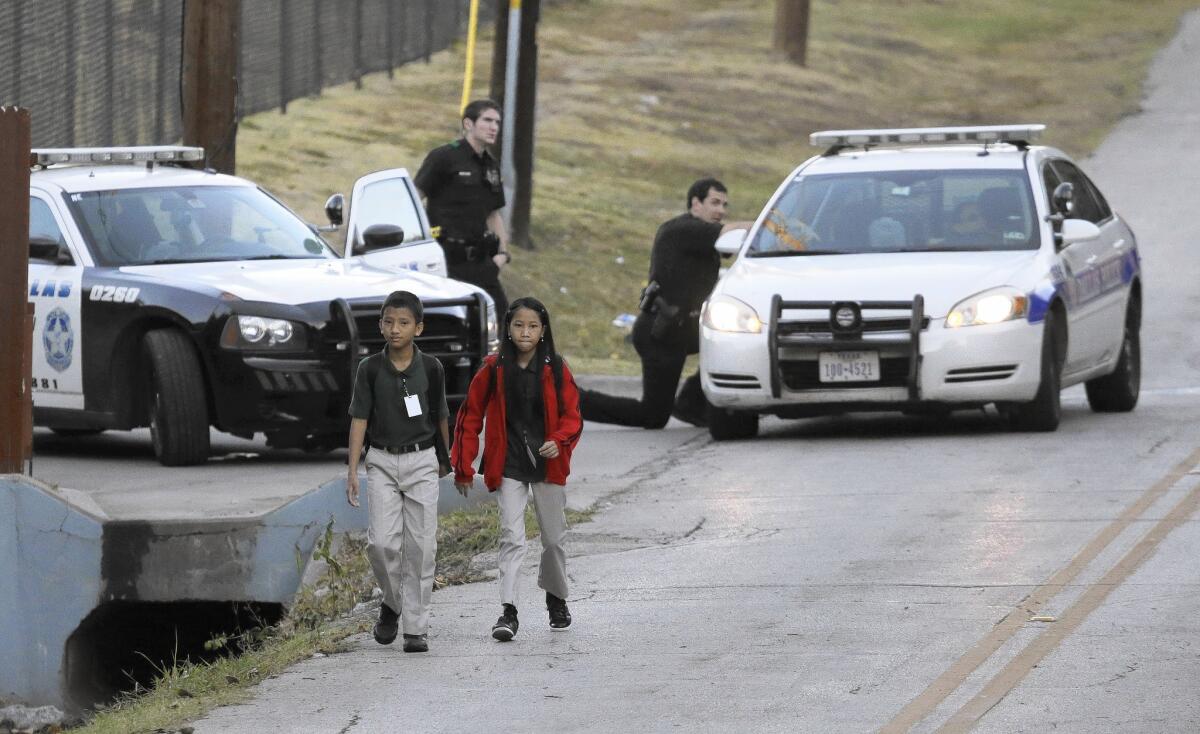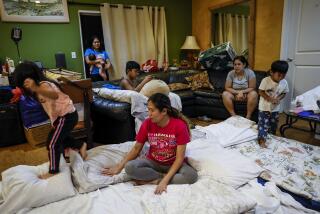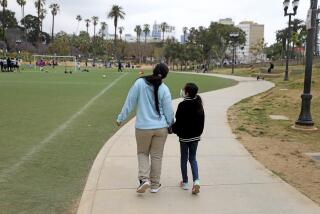After brush with Ebola in Dallas, family faces weeks of confinement

Reporting from Dallas — Youngor Jallah hasn’t left the cramped, two-bedroom apartment she shares with her husband and four children for the last four days — not since Jallah learned that her mother’s boyfriend may have exposed her family to the deadly Ebola virus.
The Jallahs are among 50 Dallas-area residents now under close watch for Ebola symptoms, part of state health officials’ attempts to prevent the disease from breaking out through those who had personal contact with Thomas Eric Duncan, a visitor from Liberia who this week became the first case of Ebola diagnosed in the U.S.
------------
For the record, 10:30 p.m. Oct. 3: An earlier version of this story misspelled Youngor Jallah’s first name.
------------
Across this part of Dallas, healthcare workers are making daily visits to Jallah’s and other homes, monitoring temperatures and searching for other signs of a disease that kills at least half its victims.
The target group, whittled down from an original network of 100, also includes healthcare workers and the ambulance team that rushed Duncan to Texas Health Presbyterian Hospital, where he is still listed in serious condition.
Jallah’s mother and three others who were in an apartment where Duncan stayed were confined there under court order, but were moved to a private house Friday. A hazardous-material team had begun cleaning the dwelling.
Jallah and her family have not been ordered to stay indoors, but because Jallah was with Duncan as his illness became critical, she has placed her family under voluntary confinement, hoping to avoid infecting neighbors or schoolmates.
After nearly five days, they were feeling trapped Friday.
Not only had no one but reporters and public health officials even thought of visiting, a storm the day before had knocked out electricity, leaving the family without hot water, air conditioning, phone service, television or Internet.
“We don’t have no diapers, and we’re running out of food,” Jallah, 35, said as her children fretted and whirled around the apartment.
Outside Jallah’s unit at Park Lane Terrace Apartments, a mix of immigrant children played with fallen oak branches in the afternoon sun on the scrubby dirt lawn, where neighbors had planted flowers and set up grills. But Jallah’s children — Prophet, 2; King, 4; Rose, 6 and Joe Joe, 11 — were not among them. School officials told the family to keep the children out of school.
Jallah and her husband, Aaron Yah, 43, have been told to stay home from their jobs at nursing homes. Yah said a supervisor told him, “The county already called and said you’re not allowed to go to work.”
The couple decided they would keep the family inside until the time period for risk of developing Ebola symptoms passed: 21 days. They’re doing so out of caution — and because they’re not sure what health officials want them to do. They now worry how they’ll make ends meet.
“We don’t know if we’re going to get paid,” she said. There are bills to pay, including $725 rent to the apartment manager, a stickler who called the previous day after hearing a rumor that one of them had Ebola.
Jallah said they had been receiving once-a-day visits from public health officials, both from Dallas County and the Centers for Disease Control and Prevention, who take their temperatures and monitor them for symptoms.
Jallah said they check themselves for symptoms, too. So far they have none — no fever, no red eyes, no abdominal pain — signs she witnessed in Duncan before calling paramedics.
Jallah’s mother, Louise Troh, had hosted Duncan, who had traveled from Liberia to Dallas on Sept. 20, at her apartment in a nearby complex in the city’s Five Points neighborhood. When he fell ill after he arrived, it was Jallah who took care of him, buying him a comforter at Wal-Mart when he suffered cold sweats, and making him a traditional leafy West African palaver stew and tea.
After his condition worsened Sunday, it was Jallah who called 911 and followed in her minivan as an ambulance took him to the hospital, all the way to Room 42, where she and a friend were turned away by nurses and a sign on the door that said “isolation.”
Troh, who works as a nurse assistant at a nursing home, was confined to her apartment by court order Thursday, along with Jallah’s 13-year-old brother, Timothy Wayne, and two other family friends, ages 22 and 28.
When they last spoke by phone Thursday, her mother said they had no symptoms.
Jallah has been praying for her. She prays for Duncan, and for the medical staff treating him.
“We pray to God that we should be safe, too,” she said.
If they get sick, she said, even though the experimental Ebola drug ZMapp is in short supply, she is confident that “America has the best doctors and medications for Ebola.”
Before her phone went out Friday, Jallah had been getting calls from friends and family around the world. She spoke with her brother in the Liberian capital of Monrovia, who warned her the situation she faced in Dallas was very dangerous. When a family gets exposed to Ebola in Liberia, he said, they are often forced to leave their house, and the area is abandoned.
In some ways, Jallah said, the uncertainty of their current situation reminds her of days as a refugee in West Africa, where she moved first from Liberia to Ivory Coast, then to a refugee camp in Guinea, then to the U.S. in 2006.
It’s “like a war zone,” she said. “Now is the most difficult.”
On Friday, Jallah piled her long braids atop her head, found a white T-shirt and camouflage pants and set to work on her apartment. She wipes down the apartment with Clorox regularly, and keeps hand sanitizer at the ready. When reporters and health officials visit, she doesn’t shake hands, and instructs her children not to touch — a tough task for 2-year-old Prophet.
“We don’t want anyone else to get this thing,” she said.
Yah added, “We all want to be on the safe side.”
Yah is a U.S. citizen, as is Jallah’s mother, and Jallah has started the process of becoming a citizen so she could adopt the children of her sister, who died in childbirth this year in Liberia. Now Jallah fears the Ebola scare may jeopardize the adoption.
She hopes that once the 21-day monitoring period is over, people will accept that her family does not pose a risk of spreading Ebola.
“Some people will understand. Some people won’t,” she said, stressing that her children never came into contact with Duncan’s bodily fluids, which is how Ebola is spread.
Her children don’t really understand what Ebola is. Before the power went out, they were watching news reports with excitement, exclaiming each time they spotted their grandmother’s apartment or Duncan’s photo, shouting, “That’s my grandpa with Ebola!”
“It’s scary,” Joe Joe said, “and boring.”
By Friday afternoon, the children had grown tired of coloring books and were busy running down the hall, jumping off the sofa, playing with belts and scraps of paper, their mother’s dead cellphone — basically anything they could get their hands on.
Their parents, clearly exhausted, tried to soothe them.
Prophet stood beside his father at the open doorway, staring outside longingly. Some neighbors were having a barbecue in the yard, and the enticing aroma of grilled beef, pork and chicken — with onions — wafted up.
When a stranger brought them pizza and soda, passing it through the door, Joe Joe began serving his younger siblings. His mother reminded him to clean up first.
“Wash your hands,” she said. “We’re talking about contagious disease here.”
Rose poured a tall glass of Sprite and began guzzling it, until her mother again intervened.
“Don’t finish it!” she cried.”We still got two more weeks in the house.”
Rose sipped more slowly. Her mother eyed the pizza boxes. In this house, food seems to disappear.
“I don’t know how long it will last us,” she said.
@mollyhf
More to Read
Sign up for Essential California
The most important California stories and recommendations in your inbox every morning.
You may occasionally receive promotional content from the Los Angeles Times.











